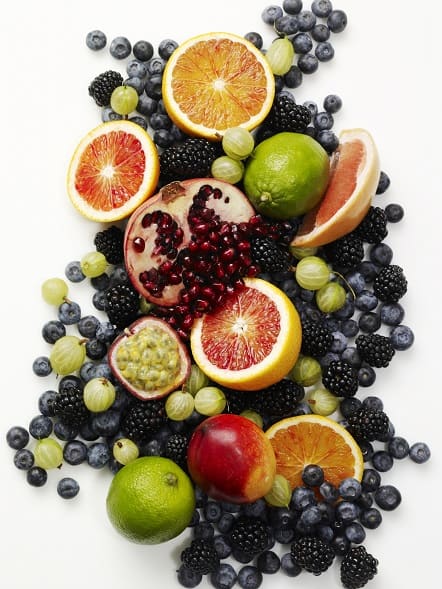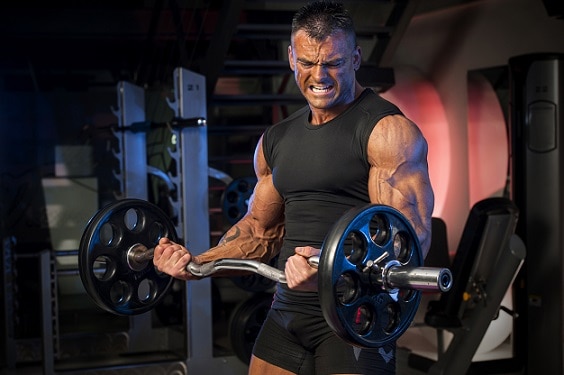 If you’ve been researching acne then you’ll almost certainly have come across testosterone and DHT.
If you’ve been researching acne then you’ll almost certainly have come across testosterone and DHT.
These androgens are touted as being the biggest villains behind acne ever. It does seem logical – after all, these hormones increase massively during puberty, and the first pimples appear in puberty too.
Hence, many acne patients are attempting to reduce their DHT and testosterone levels, whether through drugs or other therapies. Many foods like green tea, fenugreek seeds, brown rice, and saw palmetto are recommended by acne gurus for crushing androgen levels.
Perhaps you too have been recommended them. However, reducing DHT and testosterone for acne is a strategy I cannot endorse, at least not for men, mainly because they are important for many aspects of health.
The full story on these acne hormones is more complicated – they are far more benign than their reputation suggests. DHT and testosterone can cause acne, but they far from guarantee it.
How DHT/testosterone cause acne
 Testosterone and DHT are the two strongest androgens in the human body. They are behind many of the classic effects that kick in during puberty; growing muscle mass, rabid sex drive, new body hair, a deeper voice, and all the rest.
Testosterone and DHT are the two strongest androgens in the human body. They are behind many of the classic effects that kick in during puberty; growing muscle mass, rabid sex drive, new body hair, a deeper voice, and all the rest.
Both testosterone and DHT activate those characteristics by stimulating your androgen receptors. A DHT molecule, for example, causes body hair growth by binding to receptors in the hair follicles, which triggers the hair to grow or grow faster if it’s already growing. A large proportion of the startling changes we undergo in our teenage years occur thanks to these hormones…
Read Annihilate Your Acne – learn how to clear your skin permanently!
…and one of the biggest changes is spotty skin that is covered with acne. DHT and testosterone kick off the whole acne saga in the first place, by making your skin oily. Androgens bind to the receptors in your sebaceous glands, which has a huge stimulating effect; the glands dramatically rev up their output of sebum.
You’ll know the horror story that follows; your pores get blocked, p.acnes bacteria shows up, and then it’s only a matter of time before acne rears its head. That’s also why annoyed teenagers develop oily skin at about age 13. DHT/testosterone have few other acne causing powers – increased sebum production is nearly the only factor.
Nevertheless, it’s extremely significant because without blocked skin pores, it’s a lot more challenging for p.acnes bacteria to multiply. Hence, there’s no inflammatory response to them, and acne will struggle to be born at all.
However it’s not a simple, linear case of “more androgens = more acne”. DHT is a substantially stronger hormone than testosterone, especially for your skin.
DHT – also known as dihydrotestosterone, this is the most powerful androgen in the human body by some distance. When one thinks of juiced-up bodybuilders and their sex-crazed personalities, steroids or testosterone are the first words that spring to mind.
However it is actually DHT that is responsible for the vast majority of male sex characteristics. The androgen receptors for body hair, sex drive, and importantly for us, the sebaceous glands, all lie under DHT’s jurisdiction. It is DHT that causes your skin to become oily and that’s why it’s most important for acne. However, testosterone still has a role in acne to play…
Testosterone – the king of androgens and the hormone that allows DHT to be born. Both men and women produce testosterone but men have far higher levels. Until a boy is roughly 9 years old, his testosterone will be in the range of 7-20 ng/DL. By the end of puberty though, those levels will have skyrocketed to between 270-1070.
Hence, he grows into a man with dramatically increased muscle mass, changed facial bone structure, and all the other changes that rapidly occur in as little as 5 years.
The truth about dairy and acne
However, what’s interesting about testosterone is that the only effect it produces directly is increased muscle mass. That’s why bodybuilders use steroids; they are basically synthetic forms of testosterone, and are optimal for getting gigantic muscles. Every single other effect that’s associated with testosterone is actually due to more DHT being produced.
All DHT is converted from testosterone, by an enzyme called 5-alpha reductase. The reason why higher testosterone gives you a deeper voice and increased body hair is not directly due to the testosterone itself but rather that because your testosterone is high, more will inevitably get converted to DHT. For acne, this means that having higher testosterone will still result in oilier skin, even if it doesn’t directly cause it.
The implications for acne
What this all means is that if you desire to reduce your sebum production by focussing on androgens, then DHT should be your main focus.
Specifically you should focus on the 5-alpha enzyme. It’s this enzyme that is responsible for the whole conversion process; without 5-alpha reductase there would be no DHT at all.
Inhibiting this enzyme is what most DHT reduction programs for acne focus on, including the ones favoured by acne patients. Green tea has a specific antioxidant called epigallocatechin-3-gallate that directly weakens the potency of 5-alpha reductase, and hence you’ll see many acne gurus recommend it. One supplement I recommend for lowering DHT (in certain circumstances) is saw palmetto.
Recommended – 6 vitamins and minerals which could finally clear your acne
If you were to go down this road then you wouldn’t have less overall androgens in your body; testosterone would actually increase as less would be used up in conversion. However, DHT would decrease and that’s what matters. Your sebaceous glands would be less stimulated and eventually your pores would unblock, and finally your acne would improve significantly.
With that said, the DHT question is not that simple at all. For over half of acne patients, reducing DHT is totally unnecessary. In fact, doing so could wreck your health.
Whether you’re a man or a woman is absolutely vital for your approach to DHT and testosterone, because a man’s health depends on them to a far greater extent. As discussed earlier, DHT (and testosterone) are needed for all the classic androgenic effects. Without adequate DHT levels you would have no sex drive, you would have no energy, your muscles would be weak and useless, and you would develop mental problems such as brain fog and maybe even depression.
In short, your quality of life would go massively downhill. For example:
- In this 2014 study, scientists in Amirkola, Iran, took 830 elderly men with a mean age of 70.02. 237 had some symptoms of depression, while 593 had no symptoms at all. Blood samples were collected and testosterone levels were analysed. The mean serum testosterone level in the men without depression was significantly higher. The men who were depressed were far more likely to have low testosterone levels. The scientists concluded that “the results of this study showed a significant inverse relationship between serum testosterone levels and depressive symptoms in elderly men.”
If you are a man who values the enjoyment of life even slightly, then I do not recommend any acne strategies for lowering DHT levels, lowering testosterone, or inhibiting 5-alpha reductase. You would improve acne, but you’d have a whole new world of problems to tackle.
Moreover, you can still have high levels of DHT/testosterone and cure your acne. The problems for acne can be neutralised easily.
The hormone insulin is just as potent at stimulating your sebum production; it also leads to the production of another hormone called IGF-1 that is again very potent. You can lower insulin levels simply by eating less carbohydrates, and that strategy won’t hurt you. In fact, lowering insulin will improve your health as high levels are a sign that you’re about to become diabetic.
Insulin also enhances the sensitivity of your skin’s androgen receptors. Therefore, by lowering your levels of insulin, androgens will be far less damaging for acne anyway. Additionally, there are numerous non-hormonal strategies; eating vitamin A-rich foods like sweet potatoes and eggs can reduce sebum production and acne significantly.
If you’re a woman, on the other hand, then androgens are far less important for your well-being. Women do need some testosterone/DHT since particularly low levels can cause depression and tiredness just like with men, but they need far less.
That’s why if you’re female, then reducing DHT is a viable option for acne, since you won’t destroy the rest of your health. Also, a woman’s acne is far more likely to be due to high DHT in the first place, because they are more sensitive to the effects of androgens.
Read the eBook – find out how sleep deprivation causes oily skin (and acne)
There’s one story floating around the internet on men’s nutritional forums that illustrates this well. Supposedly there was a married man taking testosterone replacement therapy and he was applying testosterone cream to his skin. He was shocked to find that after touching his wife, within days she had grown facial hair. The amount of testosterone cream she absorbed from her husband’s skin would have been tiny, yet it was still enough to have masculinising effects.
This phenomenon means that the same amount of DHT can stimulate a lot more sebum production in women than men. Therefore, while a man’s skin could withstand somewhat higher DHT levels, a woman’s would stand no chance. The female acne strategy should thus be to focus on reducing insulin as well as DHT levels, which will grant you a double whammy of sebum-reducing power.
DHT/testosterone is not the biggest factor in acne!
 Many members of the clear-skin community focus on androgens like they’re the single most important factor, but the reality is that they’re not even close.
Many members of the clear-skin community focus on androgens like they’re the single most important factor, but the reality is that they’re not even close.
Take the example of blocked pores. If your sebum production is high due to excessive DHT, then you might woefully believe that your pores are doomed to be blocked…
…but DHT does not have to be dangerous if you eat enough antioxidants. The biggest problem of oily skin is that it allows more of your sebum to oxidise, and eating plenty of antioxidant rich foods can prevent that.
Your skin can easily cope with high androgens if you eat enough acne fruits, acne vegetables, herbs, spices, and dark chocolate. In fact, herbs and spices are long-forgotten powerhouses of nutrition; they’re just as great for acne as fruits and vegetables.
Likewise, you can focus on insulin, and you can also focus on the other big cause of blocked pores: high keratin production. This protein glues dead skin cells together and helps them clog your pores. Vitamin A keeps keratin in check, as do other acne vitamins, and many environmental contaminants like arsenic can stimulate high production.
7 natural topical treatments which can massively reduce acne
Consider your school days; you almost certainly had a teenage friend whose skin became very oily, yet still didn’t get acne. He or she probably had high DHT and testosterone, as most teenagers do, but unwittingly had a reasonably nutritious diet.
Maybe he ate plenty of meat, and thus lots of zinc, and that kept his inflammation down and meant that oily skin wasn’t a problem. Or maybe he played football a lot and was exposed to plenty of vitamin D-stimulating sunlight. The point to remember is this: the acne strategies for getting around high androgen levels are endless. In my 167-page eBook Annihilate Your Acne, we covered tons of factors such as sleep deprivation, stress levels, underused minerals like magnesium, and sun exposure.
You only have to look at history to assess that androgens don’t doom you to acne. Despite tons of acne patients worrying that their testosterone or DHT is too high, the modern man actually has less of both than ever before. Average testosterone levels have plummeted over the last century. There are some estimates stating that while the average testosterone level today ranges from 1070ng/DL to 270ng/DL, one hundred years ago the range was 2000-800!
Several studies have reported that testosterone levels have been dropping regardless of age; in other words, a 60 year old man today has far lower levels than a 60 year old man 60 years ago.
If androgens were the biggest factor in acne then you would expect acne rates to have plummeted as well. However, by most accounts they have shot up; today it’s estimated that 40-55% of adults aged between 20 and 40 have acne. The adult acne epidemic is a very recent phenomenon.
This doesn’t mean that androgens are not a factor in acne. They are extremely important, but what this does tell us is that they do not override every healthy dietary and lifestyle choice you could make.
Conclusion – my final recommendations
If you are a woman, then putting plenty of effort into lowering androgens is a very good idea for acne.
If you have oily skin then you will particularly need to focus on reducing DHT via 5-alpha reductase inhibitors like green tea, or possibly supplement with saw palmetto. You don’t want to go too low, because plenty of women do have testosterone deficiencies. Nevertheless, it’s a smart idea to drink an androgen blocker such as green tea or take this Oregon’s Wild Harvest Saw Palmetto (amazon link), which is the simplest and most effective DHT inhibitor I recommend on this website.
If you are a man however, then I do not recommend those acne treatments at all, because DHT is far too important for the enjoyment of your life.
There’s a lot of men suffering from the effects of low testosterone or DHT these days. Fertility rates are plummeting, a lot of men are listless and can’t focus; you don’t want to join those guys. You might reduce a few pimples on your face, but if you don’t have the energy to enjoy the activities you love, then it’s pointless.
Remember that DHT doesn’t even have to be a problem. My skin is still oily and I hardly have any acne. Getting lots of nutrients, antioxidants, avoiding inflammatory foods, and reducing stress are far more important factors.
If you are a bodybuilder or any other athlete who needs high testosterone to be competitive, then acne-free skin is well within your reach.
NEXT: forget creams and moisturisers – discover the ultimate acne-clearing diet
Thanks for reading!